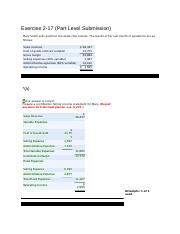
This almost always involves distributing pay on a clearly defined schedule (every two weeks is popular). As with performing payroll functions in-house, applicable taxes must be withheld by the provider before payments are made. “Payroll co-sourcing” describes a hybrid model in which some elements of the payroll process are hired away while others are completed in-house.
- You’ll also need to consider employee benefits, overtime, and security.
- On the flip side, going in-house means having more control and customization.
- To help keep up with your growing business, you might consider outsourcing payroll to shift some responsibilities off your plate, allowing you to spend time on other crucial business tasks.
- Once the possible cost savings of the practice became clearer, there was no turning back.
- If possible, consult with your own in-house security experts (or, if you’re unsure, ask an independent security expert).
When you hire an outside service to manage payroll, payroll is often their main or even sole activity. By outsourcing payroll, small businesses can save money on the cost of setting up and managing their own payroll system, and then paying an employee such as a payroll specialist to manage it. Using payroll software isn’t typically considered outsourcing since it still requires work from your team. But if your team is currently using spreadsheets to manually manage payroll, investing in payroll software is a good first step to improving your processes. When selecting an outsourced payroll provider, consider your budget, expansion goals, and payroll team’s bandwidth. Paying your workers—whether domestic or foreign—doesn’t only involve giving them their salary at the end of the month.
Consider security
Choose an efficient payroll management solution like Remote and avoid any major issues. Meeting your payroll requirements will be a breeze, and you can support team members anywhere in the world. Reduce costs, manage taxes, administer benefits, and stay globally compliant when you consolidate payroll with Remote.
If your current system causes frequent mistakes, you may want to consider outsourcing your payroll. After all, payroll mistakes can lead to high costs, wasted time, and lost productivity. It may also lead to a hard time complying with the IRS or labor laws, and employees may experience frustration due to long wait times for paychecks.
Is outsourcing HR cost-effective?

Learn how to manage global payroll for your team and keep your company compliant with international labor laws. When analyzing cost, it’s important to remember that outsourced payroll has a knock-on effect. It removes payroll tasks from your team’s plate, find the brand alignment allowing you to generate value elsewhere.
Outsourced payroll services are more than a solution to this challenge. They represent a commitment to operational excellence, so every team member receives their well-deserved earnings without delay. This approach is about more than just efficiency; it’s about building trust, enhancing morale, and fostering a workplace culture where employee satisfaction and retention are not just goals but realities.
What are the challenges large companies face when optimizing their payroll systems?
This is price to earnings ratio why you need to pick a payroll partner with ironclad security. Your partner should use encrypted systems, follow the strictest data security practices, and comply with all relevant data protection laws (like GDPR in Europe or the CCPA in California). Remote ticks all these boxes, and is in line with GDPR, SOC 2, and ISO27001 standards.
Once you find a payroll outsourcing service that best fits your needs, you’ll begin the payroll outsourcing process, further explained below. While building your business, you’ve probably had your hand in everything, from hiring employees to running payroll. And while your business may be your pride and joy, it can still be tough to do everything on no-cost online bookkeeping courses your own. Before partnering with Deel, they faced many challenges paying workers across borders, as it had to be done manually without a centralized system.
Before you hire a payroll provider, make sure to have a proper DPA in place, if necessary, to avoid potential legal issues in case the outsourcing service mishandles the payroll data. In this handy guide, we’ll run through all the advantages of outsourcing payroll services and provide all the info you need to make a seamless switch to a better way of getting your people paid. In the early days of strategic outsourcing, companies were most comfortable hiring away low-skill tasks distant from sensitive business areas.
That’s why the first thing you should consider when hiring a payroll outsourcing provider is establishing trust. Payroll providers can also handle payroll taxes and ensure you comply with local tax regulations, regardless of where employees are from. You may need to supply specific tax forms and other necessary information about workers, like their Social Security numbers or Tax Identification Numbers (TIN). For organizations, inaccurate data is the top barrier to effective payroll operations. A payroll provider’s sole responsibility is to ensure payments are made correctly and tax laws are followed.



